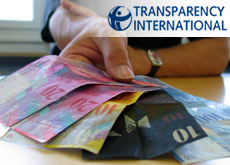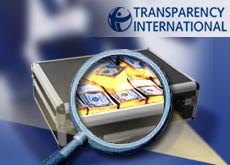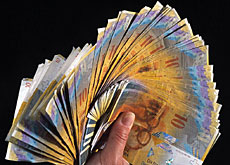Switzerland remains among least corrupt nations

Switzerland is once again in the top ten of the world’s least corrupt nations, according to global watchdog Transparency International (TI).
But Philippe Lévy, president of TI’s Swiss branch, told swissinfo that the country still needed to do more to fight corruption at cantonal and local levels.
He also said Switzerland ought to take additional steps to protect whistleblowers.
TI’s annual Corruption Perception Index (CPI) ranks 146 countries according to how corrupt they are perceived to be by economists and independent analysts.
This year Switzerland has moved up the rankings one place to seventh position, with a slightly higher rating of 9.1 points.
Like last year, Finland is the least corrupt country, leading the ranking with 9.7 points. New Zealand and Denmark occupy positions two and three, while Bangladesh and Haiti are at the bottom of the list.
swissinfo: How does Switzerland rank in comparison with other countries?
Philippe Lévy: If you look at the figures, you’ll see that there is a slight improvement. But what is more important is not the comparison with other countries but the score we get – and this has also improved slightly.
There is definitely an improvement, although it’s not going as far as we would like.
swissinfo: What has Switzerland done to improve its ranking?
P.L.: The structure of the Swiss export economy has changed. Switzerland is not active in fields that are particularly corruption-prone, such as armaments.
Switzerland, like all OECD [Organisation for Economic Cooperation and Development] countries, has changed its legislation. So nowadays bribing a foreign official is an official crime.
Furthermore, instruments have been developed for both the public sector and enterprises. We at Transparency Switzerland are trying to convince both partners that they should apply these instruments, because we have not yet achieved our goal.
swissinfo: What about money laundering?
P.L.: With regard to money laundering, we can proudly say that we have improved the situation tremendously. The Abacha millions that were given back to the Nigerian people is a good example.
In other fields – corruption among private people, whistle blowing and the protection of whistle blowers – much more needs to be done.
We want to protect whistle blowers from being the victims of their courageous actions, as they often are. We hope that this will be done in the context of the ratification of a Council of Europe convention.
swissinfo: Switzerland introduced an anti-corruption law on October 1, 2003. Has this had an impact on the fight against corruption and bribery?
P.L.: It’s too early to judge, but now not only people but also enterprises can be brought to court.
In Switzerland and in most other OECD countries, these comparatively new laws have not been applied and there have been very few prosecutions. In this area we still have to improve our performance.
swissinfo: Has the fight against corruption become more coordinated at a national level?
P.L.: At a federal level, the situation has improved, but it is still not ideal. We are hoping for improvement at the local and cantonal levels and we are developing a programme to this end.
swissinfo: Does the report consider corruption at an international level?
P.L.: Yes, for example in the gas and oil industries where the situation is particularly bad. The oil- and gas-producing countries rank very low on the Corruption Perceptions Index (CPI), because a lot of money is involved and many of those countries perform poorly regarding ‘good governance’ of the government and the public sector.
The main reason why we have to fight corruption is that the rich win, while the poor lose. And we must improve the situation with respect to good governance.
swissinfo: What has been done about the ‘old boy network’ in Switzerland?
P.L.: It’s one of the Swiss peculiarities and difficult to do something about. First, from the legal point of view, the situation is not clear. And it is also kept hidden. The only way of fighting it is to make it public, because people and enterprises are afraid of losing their good reputation.
swissinfo: Have the measures taken to crack down on money laundering had an impact on how Switzerland is perceived abroad?
P.L.: We have improved our reputation, because we have now a policy, a behaviour that is considered as more positive than in the past – e.g. the transfer of the Abacha millions. In international comparison, we have improved our performance.
swissinfo: How effective is the CPI if there is no dramatic change in Switzerland?
P.L.: It’s a perception index, so you can’t expect jumps, but the progress we make is positive. We would [like to] be number one on the list, but it’s important that there is an awareness of the phenomenon in Switzerland.
For the countries at the bottom of the list, it is a valuable incentive to improve their ranking and to fight corruption. Having a corrupt environment is a disincentive to direct investors.
swissinfo-interview: Katalin Fekete
In this year’s Corruption Perception Index, 146 countries are ranked with regard to corruption.
Transparency International says Switzerland has taken measures to crack down on corruption, which has led to the country being perceived in a more positive way.
TI maintains that more remains to be done about corruption at cantonal and local levels and about the “old boy network”.
Switzerland is in 7th place.
Finland, New Zealand and Denmark lead the rankings with 9.7, 9.6 and 9.5 points respectively.
Haiti and Bangladesh are at the bottom of the list with 1.5 points each.
60 out of 146 countries are considered highly corrupt, scoring less than three out of a maximum ten points.

In compliance with the JTI standards
More: SWI swissinfo.ch certified by the Journalism Trust Initiative










You can find an overview of ongoing debates with our journalists here . Please join us!
If you want to start a conversation about a topic raised in this article or want to report factual errors, email us at english@swissinfo.ch.